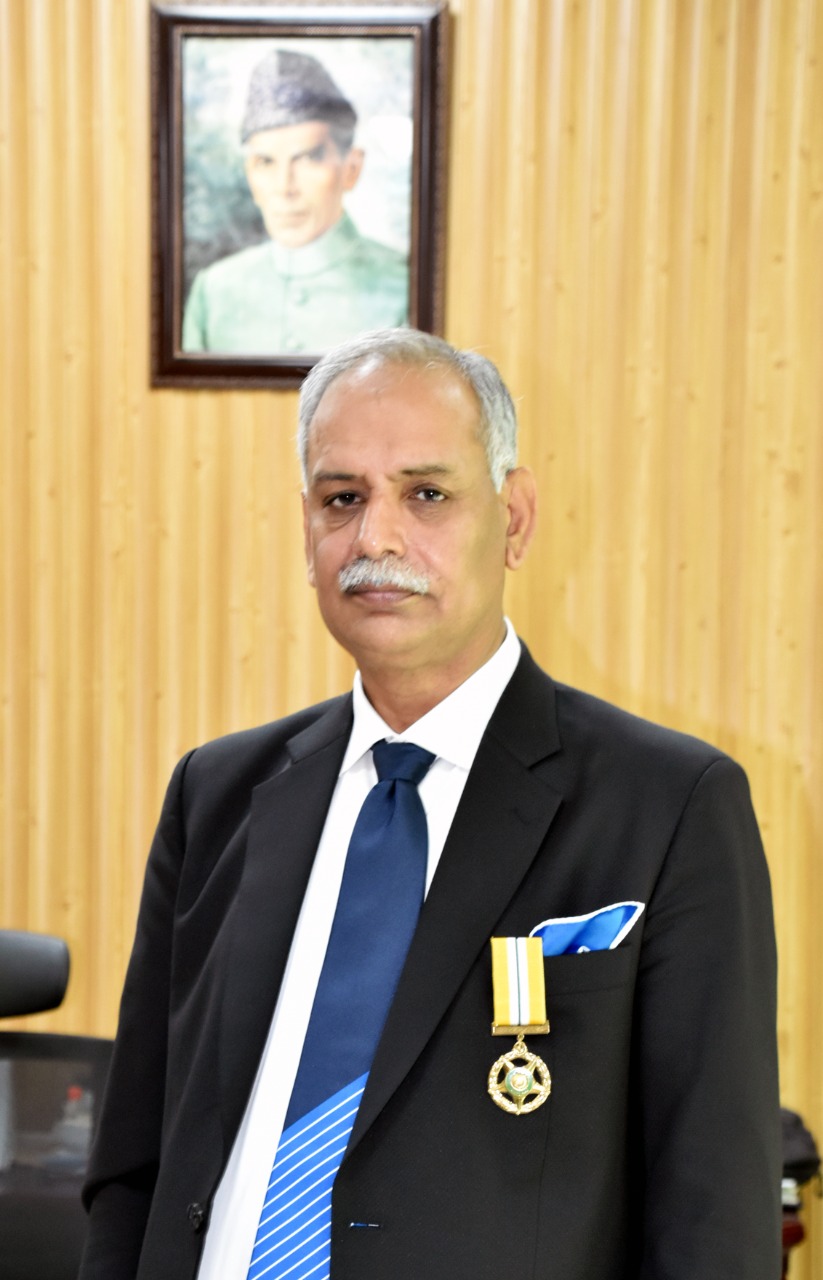
Dr. Asif Ali Khan, PhD (Tamgha – e – Imtiaz), is the Chairperson of the National Seed Development and Regulatory Authority (NSDRA), Islamabad, Pakistan. He is a Professor Emeritus, UNESCO Chair, and former Vice Chancellor of MNS University of Agriculture, Multan, Pakistan.
Dr. Khan earned his PhD in Breeding and Genomics from the University of Liverpool, UK, and an MBA in Information Management Systems. He has also served as a visiting professor at the University of California, Davis, USA. An outstanding geneticist and plant breeder, he has supervised 17 PhD scholars and authored 13 books, chapters, and manuals, while publishing over 150 research articles in high-quality journals.
He has developed several crop and vegetable varieties for general cultivation, including Okra 3A, Rachna Maize, QS Super Sorghum, Chenab Pasta Wheat, and Spinach. His contributions also include advancements in protocols for efficient screening of crop plants for salinity tolerance, non-radioactive microsatellite enrichment, rapid DNA extraction, and a low-cost indigenous CEL 1 production protocol and TILLING platform in cotton.
Dr. Khan has successfully completed approximately 20 research, outreach, and capacity-building projects with grants from prestigious organizations, including ACIAR, DAAD, USAID, DFID, ICDD, IFPRI, British Council, NSFC, PSF, ALP, HEC, and PARB.
In addition to developing a new university on a rapid growth model, Dr. Asif Ali Khan has made significant contributions to agriculture and social sector development. His exceptional accomplishments have been recognized by the Higher Education Commission (HEC) with the Best Teacher Award and by the Government of Pakistan with the Civil Award (Tamgha-e-Imtiaz) in 2020.
Qualifications and Achievements
Professor Asif Ali has dedicated his career to higher education, establishing himself as an outstanding researcher in the field of agriculture. He has held numerous senior leadership roles, including serving as the Vice-Chancellor of the MNS University of Agriculture, Multan, since January 2016. His multifaceted professional experience includes roles as a Tenured Professor in Plant Breeding and Genetics, Director ORIC, Director Business Incubation Centre, and Director External Linkages at the University of Agriculture, Faisalabad (UAF), Pakistan.
Dr. Asif earned his Ph.D. in Breeding and Genomics from the University of Liverpool, UK, and an MBA in Information Management Systems. To further enhance his expertise, he completed a Postdoctoral Fellowship in Genomics at the University of California, Davis, USA, specializing in mutation breeding, molecular genetics, and stress tolerance. His extensive knowledge enables him to expand technical insights across the agricultural value chain and provide exceptional academic leadership.
As a researcher, Dr. Asif has significantly contributed to agricultural advancements. He was a member of the breeding team for FH87, a high oil-content cotton variety, and the Cotton Breeding Group at UAF, where he developed promising strains such as B622, B630, PB38, and PB896. These strains exhibit resistance to bollworms, high yield, and improved drought and salinity tolerance. He also introduced an okra line resistant to Yellow Vein Mosaic Virus. Dr. Asif has enhanced protocols for crop plant screening, non-radioactive microsatellite enrichment, rapid DNA extraction, and low-cost CEL 1 production. His extensive research is documented in over 140 peer-reviewed publications in prestigious journals.
Dr. Asif has had a profound impact as an educator, supervising more than 15 PhD students and over 60 MSc students in conventional and molecular plant breeding, using crops like wheat, cotton, maize, and vegetables as models. His contributions as a research manager include developing human resources, mobilizing resources for basic and applied research, and fostering collaboration with national and international funding bodies. These efforts resulted in over 50 agreements with universities in the US, Europe, and Australia, leading to increased collaboration, student exchanges, and a fourfold rise in research funding.
In 2011, Dr. Asif was appointed the Founding Director of ORIC at UAF, where his dedication transformed the office into one of the university's most dynamic departments. Under his leadership, national and international research funding exceeded 2.5 billion PKR by 2015. He spearheaded the commercialization of research outcomes, registering over 12 startups, incubating 17 companies, and establishing academia-industry linkages. These efforts significantly improved UAF’s national and international rankings, making it the only Pakistani university ranked among the top 100 globally.
As Vice-Chancellor of MNS University of Agriculture, Multan, Dr. Asif developed the university's vision and strategic plan, recruited highly qualified faculty, and established statutory bodies, faculties, and departments. He introduced nine undergraduate and 21 postgraduate programs, raised over 400 million PKR in research funding, and implemented a master plan for the campus and agricultural farms. His leadership resulted in the creation of a world-class campus equipped with laboratories, greenhouses, and agricultural research facilities.
Dr. Asif’s exceptional contributions have earned him numerous accolades, including the Best University Teacher Award in 2014 and recognition as a prolific researcher and visionary leader in Pakistan’s agricultural sector. His efforts to build a knowledge-based economy through research commercialization, technology transfer, and community service have been commendable, making him a valuable asset to the university and the nation.

